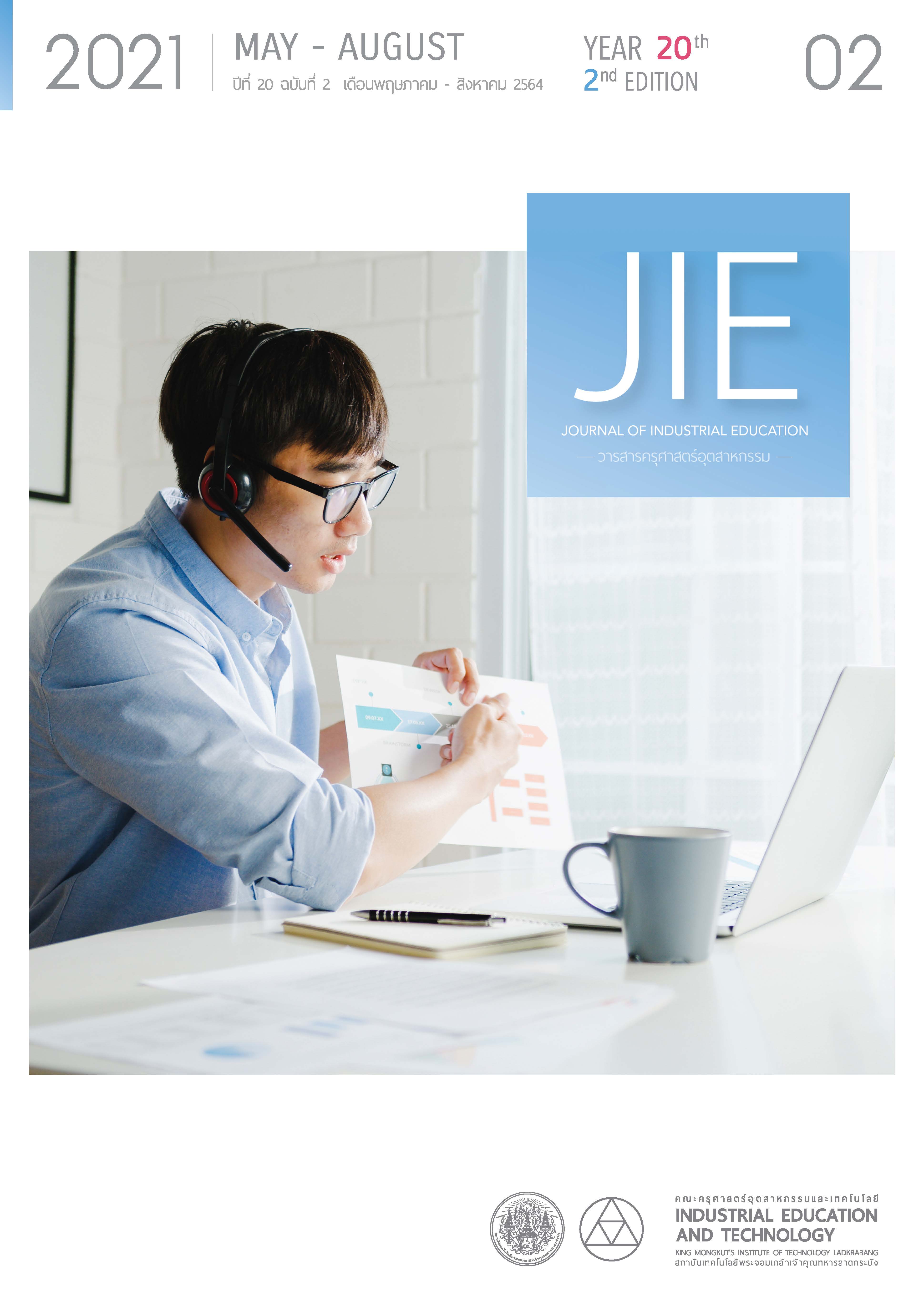DEVELOPMENT OF A LEARNING MANAGEMENT MODEL ACCORDING TO THE PROFESSIONAL STANDARDS OF A MANAGER IN THE HEAT TREATMENT INDUSTRY IN THAILAND
Keywords:
Learning management model, Learning management plan, Course specification, Heat treatment industry, Occupation standardAbstract
This research is aimed to develop a course specification of curriculum, improve a model of learning management, and study the learning achievement of learners according to the learning management model occupational standards of managers in the heat treatment industry. The research population consisted of 21 third year undergraduate students in a bachelor of technology in industrial technology, majoring production technology, Department of Production Technology Education, Faculty of Industrial Education and Technology, King Mongkut's University of Technology Thonburi. The research instruments consisted of course specification, learning management model, learning management plan, assessment form of course specification, correspondence with occupational standards evaluation form for the suitability of the learning management model, and quality assessment form learning management plan. The used statistics for analyzing the data were mean () and standard deviation (S.D.). The research results showed that the assessed result for consistency and suitability of course specification and the career standard details was in the appropriate criteria (IOC = 0.95). The results of the evaluation of the composition for the learning management model according to the occupational standards were at the most appropriate level (
= 4.71, S.D. = 0.43). The results of the assessment of the overall learning management plan quality were the highest (
= 4.67, S.D. = 0.31). The result of test scores during study and post-study scores the process to result efficiency ratio (E1/E2) was 80.11/82.33, which was higher than the threshold setting of 80/80.
References
Sessomboon, P., Poongam, J., Puthanupab, A., & Chumprasert, V. (2021). “Implications for labor skill development on wage inequality: Perspectives from the regional labor market.” Focused and Quick. (183), 1-15. (in Thai)
Office of the National Economic and Social Development Council. (2019). Annual report 2019. Bangkok: Office of the National Economic and Social Development Council. 68-72. (in Thai)
Thailand Environment Institute. (2011). Lean management for environment manual for metal industrial. Bangkok: Thailand Environment Institute. 3-4. (in Thai)
Roongsangjun, T. (2018). “Preparedness for the 4th renovation of Thai Labor.” Journal of Social Work. 26(2), 172-204. (in Thai)
Lee, A. S., & Jacobs, R. L. (2020). “A review of national occupational standards and the role of human resource development in their implementation.” Human Resource Development Review. 20(1), 46-67.
James, N. M., & Warren P. S. (2021). “Characterizing engineering work in a changing world: Synthesis of a typology for engineering students' occupational outcomes.” Journal of Engineering Education. 110(1), 1-43.
Sishchuk, J., Oblova, I., & Mikhailova, M. (2020, May). “The comparative analysis of the United Kingdom and the Russian federation occupational standard development.” Integrating Engineering Education and Humanities for Global Intercultural Perspectives. St. Petersburg, Russia.
Faculty of Industrial Education and Technology, King Mongkut's University of Technology Thonburi. (2018). Self-assessment report 2018 bachelor of technology program in industrial technology. Bangkok: King Mongkut's University of Technology Thonburi. 32-36. (in Thai)
Mahamad, K., & Koseeyaporn, P. (2015). “Development of integrated learning management model for enhancing competence in technical education learning: A case study of Department of Electrical Power, Phetchaburi Technical College, Petchaburi Province.” Area Based Development Research Journal. 7(2), 74-91. (in Thai)
Wiriyanon, T. (2018). “The development of competency-based curriculum for assessor relating to vocational qualification system.” Journal Technical Education Development. 31(110), 57-65. (in Thai)
Dangprasert, S., & Khamtub, P. (2018). “The development of competency-based curriculum structure based on the occupational standard.” Journal Technical Education Development. 32(112), 27-36. (in Thai)
Dangprasert, S., & Khamtub, P. (2019). “The development of competency-based learning module in an animation major.” Journal Technical Education Development. 32(113), 22-29. (in Thai)
Lertpunya, A., Utakrit, S., & Chianchana, C. (2018). “The curriculum development of teacher training in the vocational instruction to develop work problem solving thinking skills.” Technical Education Journal. 10(2), 138-147. (in Thai)
Kamtab, P., Wiriyanon, T., Dangprasert, S., & Chanyawudhiwan, G. (2019). “The development of learning management system for enhancing the competency based on the occupational standards in an animation major.” Technical Education Journal. 11(3), 134-142. (in Thai)
Department of Production Technology, King Mongkut's University of Technology Thonburi. (2019). Final report, project for the preparation of professional standards and professional qualifications industrial production of machinery and metal. Bangkok: King Mongkut's University of Technology Thonburi. 35-122. (in Thai)
Dick, W., Carey, L., & Carey, J. O. (2015). The systematic design of instruction. 8th ed. New York: Pearson Education. 5.
Smith, P. L., & Ragan, T. J. (2004). Instructional design. 3rd ed. New Jersey: Prentice-Hall. 3.
Richey, R. C., Klein, J. D., & Tracey, M. W. (2011). The instructional design knowledge base. New York: Routledge. 19.
Shambaugh, R. N., & Magliaro, S. L. (1997). Mastering the possibilities: A process approach to instructional design. Boston: Allyn and Bacon. 23.
Likert, R. (1932). “A technique for the measurement of attitudes.” Archives of Psychology. 22(140), 55.
Andriušaitiene, D. (2018), “Occupational standards: A key to improving match between skills and labor market needs in Lithuania.” Economic and Culture. 15(2), 88-98.
Polsawat, A., & Chansiriwat, T. (2016). “The development of learning model for student by using problem-based learning for teaching practical skills course in programmable logic controller technology.” Journal of Humanities and Social Sciences Valaya Alongkorn. 12(1), 62-72. (in Thai)
Dittapanya, P., & Haemaprasith, S. (2020). “Effects of problem based learning with think pair share technique to develop scientific problem solving ability and self confidence of fifth grade students.” Journal of Industrial Education. 14(2), 24-41. (in Thai)
Brahmawong, C. (2013). “Media performance testing or teaching suite.” Silpakorn Educational Research Journal. 5(1), 7-20.
Downloads
Published
How to Cite
Issue
Section
License
"The opinions and contents including the words in papers are responsibility by the authors."
"ข้อคิดเห็น เนื้อหา รวมทั้งการใช้ภาษาในบทความถือเป็นความรับผิดชอบของผู้เขียน"



